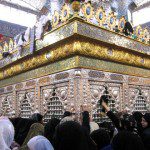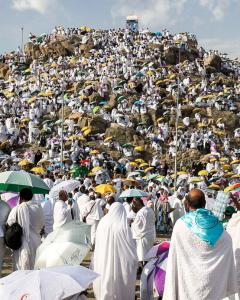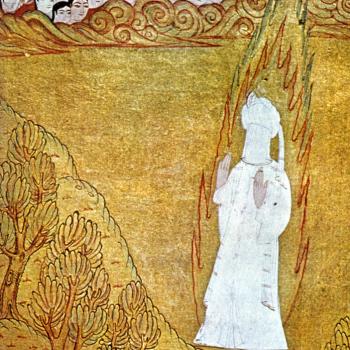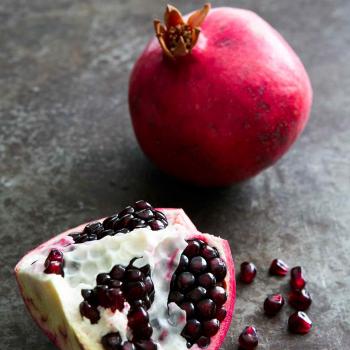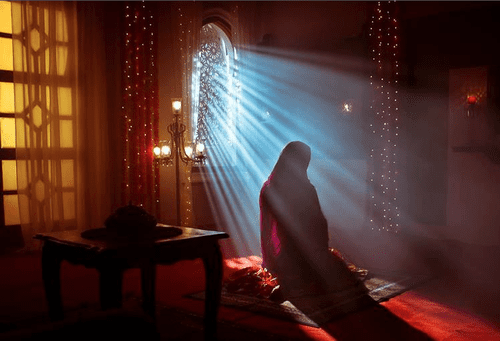
We sat in our circle in a bright hall, the sunbeams highlighting dust motes in the air. Our teacher was beginning the invocation before we began our loud zhikr together. He said the familiar words to welcome all the prophets and saints into our remembrance, our hearts, our gathering. And for what felt like the first time, I heard, “We welcome Khadija, Fatima and Aisha.”
I’m sure the words had been shared before, but perhaps this time my heart was actually listening. Something shifted in my awareness, an opening. Why should this feel different? Of course, these Holy Mothers should be in our prayers, our remembrance; this was no new idea, no radical innovation. And yet, for some reason, that bright dust-mote day, these Holy Mothers entered my heart in a new way.
Khadija, may God sanctify her soul, had always been a central figure for me when it came to the Prophet Muhammad’s life, peace and blessing be upon him. As a young child, sitting in a madrassa, probably on a wet Yorkshire evening (or perhaps it just felt wet because the mosque basement was always damp), I soaked up the stories of the Prophet’s life and companions, told very animatedly by the Imama’s teenage daughter – who just happened to be called Khadija. So of course, there was much emphasis on her namesake of whom she was, quite rightly, very proud. This early meeting with the Prophet’s first wife developed into a deep love. Camille Adams Helminski writes of Khadija in her book, Women of Sufism, that she was known as at-Tahira, ‘the pure one’, and was “a woman of great integrity, intelligence, and spiritual depth”.
Her integrity was surely well-matched in her husband. Another beautiful line that captures their relationship is: “More independent now that he was supported by Khadija’s love as well as her wealth, Muhammad would often retire to a nearby cave to meditate and pray…”
Khadija’s intelligence and spiritual depth is no more evident than when Muhammad receives his first revelation and thinks he has become mad. It is she who comforts and consoles him, reassuring him that he is not crazy but, truly, he has received divine guidance. If Khadija had not been there to cover Muhammad in her cloak, embrace him with her honest love, and turn to her Christian cousin to confirm the prophecy of the coming messenger, would Islam have survived? For me, Khadija was the first believer, who innately knew and accepted the message – it was she who converted Muhammad.
For twenty-five years Khadija was at Muhammad’s side, valiantly strengthening him during the turbulent and vicious attacks on the new Muslim community with her love and the last of her wealth. She raised their children “with a strong sense of Spirit and reliance upon their Sustainer” just like herself. Muhammad mourned her all his life. In my heart, Khadija towers over Islam, a divine archetype of strength and enduring love.
Fatima, may God preserve her secret, is the most celebrated of Muhammad’s children, no doubt in part due to her being by her father’s side throughout most of his life, supporting him as her mother had done before her. So great was her loving concern for her father that she became known as Umm Abi-ha, ‘the mother of her father’. Born during the beginning of the revelation, she was intimately steeped in her father’s message. And later, she married Muhammad’s cousin and closest friend, Ali.
I never tire of hearing how much father and daughter loved each other, how each would get up whenever the other entered the room, greet and kiss each other, seat the other in their place. I delight in imagining Muhammad seating Fatima in his place, between Abu Bakr and fierce Umar, who might quieten under the gaze of her luminous face. Perhaps the men would lower their eyes, soften and become shy in her presence. I sense Fatima as beautifully subtle yet incredibly powerful, just like the moon she is oftentimes compared with.
And then there is Aisha, may God bless her fire. Of all the Holy women of faith, Aisha is the one I have struggled with the most. Somewhere along the way – I know not where – I gained, what felt like an almost blasphemous, dislike of this ‘Mother of the Faithful’.
My husband joked that it was due to my loyalty to Khadija, the only wife with whom Muhammad was monogamous, that I had this uncomfortableness with Aisha. And true, I do love that Khadija and Muhammad’s monogamous relationship matches my own marital relationship. But it has always been more than that. I would always hear about how feisty Aisha was, a word with negative connotations in my community (especially as it was applied very often to me as a child and teenager). She dared to dabble in politics and warfare and suffered the consequences – she gave women who wanted power a bad name.
I mentioned my issue with Aisha to a dear friend some years back and he recommended I read some books – fictional and non-fictional accounts of her life. That didn’t help – in fact it made it much worse. The writers either wrote about her in a derogatory way: she was wilful (feisty), spoilt, undermined Ali, and involved herself in matters beyond her concern (beyond her womanly capabilities); or they sycophantically applauded everything about her, increasing her virtues by decreasing the virtues of and being disrespectful to Khadija and Fatima! And most injurious in my eyes, she disliked Muhammad’s continued love of Khadija – never mind the eight other living wives, she was jealous of the dead one! My confusion led to an internal obsession with needing to understand who she really was, and what her place was in my life and my understanding of the Prophet.
Over time, sitting with the idea of Aisha in remembrance, I feel my heart has uncovered a little of her beyond my limited conditioning. How did this Humaira, ‘the red-haired one’, feel as the youngest, and only, virgin wife? What power and passion did she absorb, witnessing so many of the Prophet’s revelations? I see a young wife, curled up in her small hut as the Prophet did his night prayers, and how “when he would bow in prostration, she would tuck up her feet to make space for his forehead and hands”.
What heartache did she go through when she was accused of adultery and her husband wavered in his belief of her? Did she feel vindicated when God revealed her truth, or did she feel rage that the Divine had to step in and defend her when her family did not? How might my heart have darkened towards those who spoke against me, towards Ali? Now I see her actions later in life, when she joined forces against Ali, being perhaps less about her former resentment and more about her righteous upholding of justice for Uthman’s murder. She may have been wrong in how she went about it, but I too have made grievous errors based on my perceived righteous behaviour. Until her dying breath, she remained repentant for her part in the rebellion.
Finally, I feel open to this most beautiful, courageous, and fiesty of women! May I be blessed to know this Mother of the Faithful, may she accept and guide me towards being one of her children.
I am so grateful for that bright dust-mote day, for the hearts that introduced me to the guidance of these Holy Mothers, whom I can now call upon in my prayers and in my daily life, when I need love and discernment, grace and presence, strength and integrity.
Bismillah, I welcome Khadija, Fatima and Aisha, and I humbly request to be welcomed by them.

